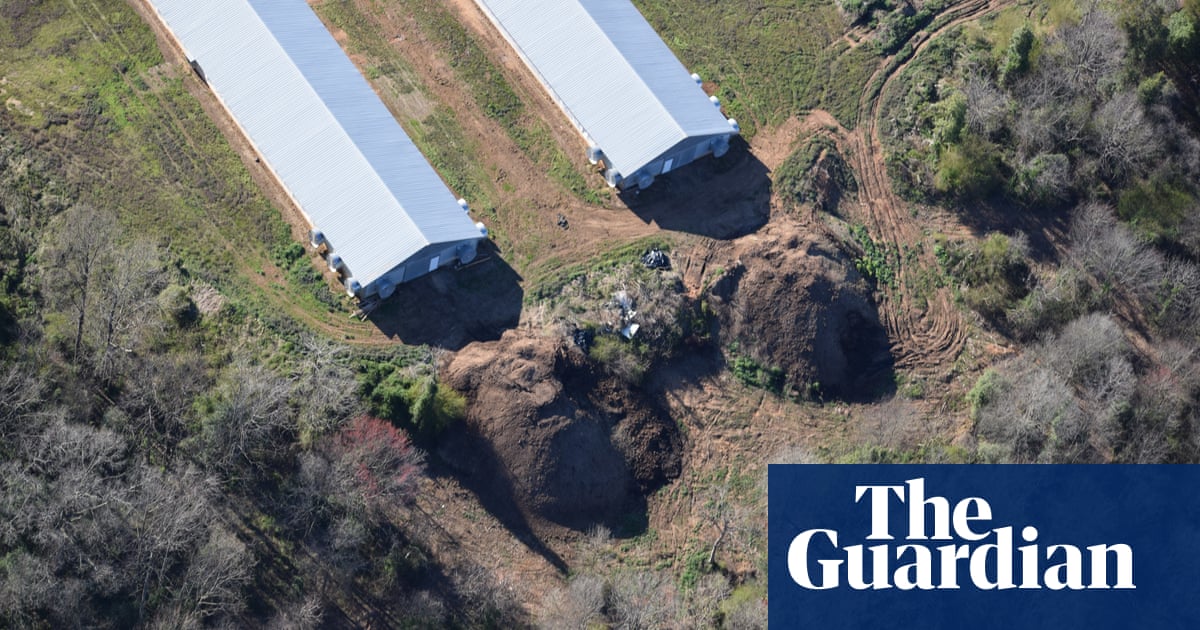Jefferson Currie II is at war with flies.
Spotted flypaper dangles from the ceiling of his home in North Carolinaâs Scotland county. He shows off a two-quart jar trap, marketed as an outdoor pest control solution for farms, full of flies heâs caught indoors. On Zoom meetings for his job as the Lumber Riverkeeper with the non-profit Winyah Rivers Alliance, he mutes himself and goes offscreen to avoid distracting others with the heavy thunk of his pump-action, salt-shooting plastic fly gun.
The flies are here, said Currie, because North Carolinaâs poultry industry has given them the perfect feeding grounds: massive piles of feces, urine and sawdust bedding, cleared from industrial-scale chicken barns. These heaps of waste are left exposed to the elements for days on end before being worked into agricultural fields as fertilizer. He lives half a mile from a facility with 16 such barns and within a mile of a dozen more, which grow birds on a contract basis for companies such as Tyson Foods, Perdue Farms and Mountaire Farms.
âI come outside some mornings, and with my cup of coffee I get a nice mouthful of chicken litter,â Currie said with a rueful grimace. âChicken manure in the mouth: It just tastes good, smells good, feels good.â
Large âdry litterâ poultry operations like those of Currieâs neighbors have swelled across North Carolina in recent decades. According to the US Department of Agriculture (USDA), the state sold over 972 million meat birds in 2022, up from about 663 million in 1997. Nearly three-quarters of those birds came from farms averaging over 918,000 chickens each per year.
That growth has probably stemmed, at least in part, from North Carolinaâs uniquely permissive regulatory regime. Dry litter facilities are exempt from the waste permitting requirements that apply to industrial swine or cattle operations. State law forbids local governments from zoning land to restrict poultry barns. Concerned communities have practically no way to slow the spread of poultry production or demand mitigation of its harms.
While the state department of agriculture and consumer services gathers details about poultry farm locations, which could help assess the industryâs collective impact in a given area, it will not share any data with researchers or regulators, citing a law that keeps identifiable farmer data secret. No other state, including larger producers like Alabama and Georgia, places such lax requirements on industrial poultry growers.
A joint investigation in 2022 by the Charlotte Observer and the News & Observer in Raleigh estimated that North Carolinaâs poultry operators generate about 2.5bn pounds of manure each year, creating substantial pollution. (Bob Ford, executive director of the North Carolina Poultry Federation, did not respond to multiple requests for comment on this story.)
The industryâs rise has acutely affected rural counties like Scotland (22.4 million broiler chickens sold in 2022, compared with 7.7 million in 1997) and neighboring Robeson (52.9 million in 2022, 16.9 million in 1997). The region includes some of the stateâs densest populations of Black, Latino and Native residents, among them Currie, an enrolled member of the Lumbee Tribe of North Carolina.
With few state-level avenues for regulatory relief available, Currie and fellow Lumbee activist Donna Chavis, together with the non-profit Friends of the Earth, took their case to the federal Environmental Protection Agency. Last April, they partnered with the environmental justice clinic at the Vermont Law and Graduate School to file a formal complaint against the North Carolina department of environmental quality (NCDEQ) under Title VI of the Civil Rights Act, which prohibits race-based discrimination in federally funded programs.
The complaint alleges that NCDEQ is âabdicating its responsibilityâ to regulate an industry with proven environmental impacts in North Carolina and beyond, including nutrient leaching into waterways and ammonia emissions into the air. Currie said he had personally observed high bacteria levels, algal blooms and fish kills, all tied to runoff from poorly managed chicken waste.
Because these impacts disproportionately fall on communities of color, the complaint continues, Title VI empowers EPA officials to require tighter state rules as a condition of future support. The agency is a major funder, allocating almost $291m to North Carolinaâs environmental regulator in the 2022-23 fiscal year alone.
âWhen you have a state like North Carolina disregarding its public protection mission in favor of an entrenched industry, the legal tools under the big environmental statutes are limited,â said Christophe Courchesne, a Vermont Law professor and attorney who helped file the complaint. He says environmental justice groups have increasingly turned to Title VI as a creative legal strategy, including in North Carolina, where a 2018 settlement over another complaint against NCDEQ led to stronger monitoring of swine facilities.
In the few instances where North Carolina has put restrictions on poultry farms, advocates say, the state rarely punishes violations. For example, explained David Caldwell, Broad Riverkeeper with the non-profit MountainTrue, regulations prevent farmers from leaving piles of chicken waste standing uncovered for more than 15 days, but that rule is often ignored.
Caldwell has partnered with the non-profit SouthWings to conduct aerial monitoring of poultry farms and document uncovered litter piles. âI remember one particular pile of waste as big as my house, and it was never covered up â I probably flew over it 10 times,â he recalled.
On another occasion, Caldwell conducted three flyovers of his watershedâs biggest poultry facility within a 16-day period, documenting the same uncovered litter piles on each occasion. He shared that evidence with NCDEQ, asking the state to require a cleanup; instead, he said regulators just visited the site and asked the operator to cover the piles.
Other riverkeepers told the Guardian that the state refuses to consider their photographs of uncovered waste as evidence of violation, even as it commits few of its own resources to monitoring poultry. Without NCDEQ keeping a close eye on these facilities, said Caldwell, non-profit water protectors are one of the few groups trying to hold the industry accountable.
Josh Kastrinsky, a NCDEQ spokesperson, declined to comment on the Title VI complaint, and a public records request filed on 24 January seeking the departmentâs internal communications on the matter remained unfulfilled as of press time.
âTo date, the department does not have statutory permitting authority for dry litter poultry waste management systems,â Kastrinsky said. âThese operations are deemed permitted under [state administrative code] and must comply with certain restrictions and record-keeping on storage and transfer of dry litter.â
Although NCDEQ is the Title VI complaintâs target, North Carolinaâs legislature shares much of the blame for the current situation, said Brooks Rainey Pearson, a lawyer with the non-profit Southern Environmental Law Center who was not involved in the filing.
Sheâs been lobbying for greater oversight of the poultry industry in the capital of Raleigh since 2012 and says the Republican-dominated general assembly hasnât allowed any progress. House Bill 722, the poultry waste management bill she helped the Democratic representative Pricey Harrison introduce in the last legislative session, was immediately buried by the Republican-led House rules committee.
âWe have a legislature that is catering to factory-farm interests. Theyâre very strong lobbies,â Rainey Pearson said. And legislators from impacted areas often have ties to the poultry industry; Republican representative Jarrod Lowery, who represents Robeson county and serves on the state Houseâs agriculture committee, was previously a spokesperson for Mountaire Farms and sat on the North Carolina poultry federation board. (He also did not respond to multiple requests for comment.)
Itâs unclear if the Title VI appeal to the EPA will be any more successful than efforts at the general assembly. While federal standards call for the agency to determine whether it will consider the complaint within 90 business days of receipt, the matter was still listed as âunder jurisdictional reviewâ as of 20 March, 11 months after its filing. EPA officials did not acknowledge the Guardianâs requests for an update.
Meanwhile, on 23 January, Louisiana won a US district court case to limit the scope of the agencyâs Title VI application in that state. Blakely Hildebrand, another Southern Environmental Law Center attorney who has filed a different civil rights complaint against NCDEQ, called that decision âvery concerningâ and said its impact on pending cases elsewhere in the country remained to be seen.
Back in Scotland county, Currie is determined to keep up his fight. Heâs motivated by the flies that the underregulated poultry industry attracts to his home, but much more important to him is its impact on the surrounding waterways. The Lumber River gives the Lumbee their name, and he said its swamps offered the community shelter during the expansion of European settlement.
âI want the water to be something that is sacred and important and held in the kind of respect that I hold it. And I think other tribal members do as well,â said Currie. âI want us to do better as a state, as a country, because we can do better.â



